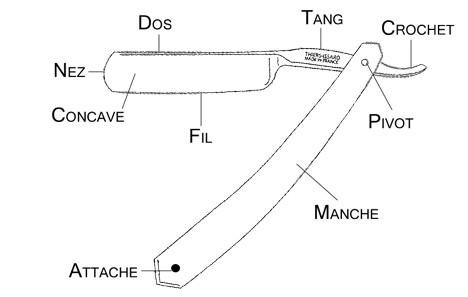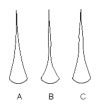Choosing your straight razor

The blade

Most barbers preffer the concave grind, which come in full concave, 1/2 concave and 1/4 concave. In this picture, A depicts a flat grind, B a full concave grind and C depicts the 1/4 concave grind.
The full concave grind produces a very sharp edge. But being so thin, the edge is more prone to rolling or damage than other grinds.
The temper
Tempering a razor makes it acquires the proper degree of hardness required for a good cutting edge. Razors can be purchased with a hard, medium or soft temper.
The hard tempered razor: i.e Stainless Steel.
Will hold an edge longer, but is very difficult to sharpen once the edge is down.The soft tempered razor: i.e. High Carbon Steel
Is very easy to sharpen, but the sharp edge does not last long.
The size
The size of the razor depicts the length and the width of the blade. The width of the razor is measured in eighths or sixteenths of an inch, but most generally in eighths, such as 3/8, 4/8, 5/8, 6/8 and 7/8.

A wide blade carry more lather. It allows more shaving time and minimises blade rinse cycles. The disadvantage of such a blade resides in its manoeuverability. A narrow blade shaves tight facial spots such as under the nose, but it must be rinsed more often. The most popular blade width size is 5/8.
The nose

The nose refers to the point type of the blade.
There are three main types of points:
Square point
This point is called so because the point profile is straight and
terminates at perpendicular to the cutting edge of the razor. This type
of blade is used for precise shaving in small areas but, at the risk of
pinching the skin, it requires some experience in handling.
French point
This point profile looks like a quarter circle. It ends in a similarly
sharp point as the square point but lacks the abrupt straight line. The
difference between these two is mainly aesthetic.
Round point
This point profile is semicircular and therefore lacks any sharp end
points. As such it is a more forgiving blade and thus recommended for
relatively new users.
Stropping
Flat razors should be sharpened using strops with wooden handles, where the razor can be "pushed" along the strop.
Hollowed razors should be sharpened using hanging strops.

